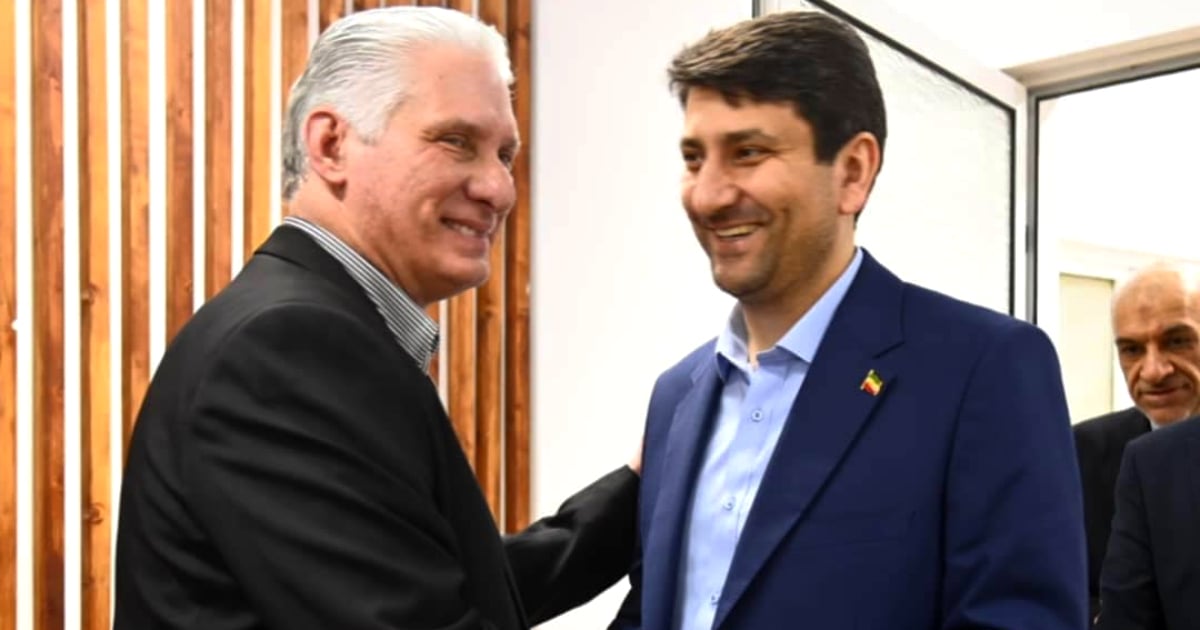During the 2024 Havana International Fair (FIHAV), Iran's Minister of Communication and Information Technology, Dr. Seyed Sattar Hashemi, met with Cuban leader Miguel Díaz-Canel. Dr. Hashemi expressed that he feels "like at home" in Cuba. In their meeting, Díaz-Canel praised Hashemi's presence at FIHAV and highlighted the robust participation of Iranian companies, eager to "collaborate with Cuba."
Strategic Alliances and Authoritarian Commitment
This familiar sentiment shared by Hashemi underscores a deep-rooted ideological alignment and growing political partnership between both regimes, despite global condemnation. Their mutual disdain for democratic values and preference for authoritarian control have brought them closer over the years.
The relationship between Cuba and Iran is not a recent development. High-level visits between the two nations have increased over the past decade. In July 2024, Cuba's Prime Minister, Manuel Marrero Cruz, attended the inauguration of Iranian President Masoud Pezeshkian in Tehran, reinforcing Cuba's commitment to its Iranian counterpart. Marrero emphasized the "historic relations" and their "convergence on the international stage" in the face of sanctions and isolation imposed by democratic countries critical of their repressive practices.
Their diplomatic exchanges also extend to economic matters. In 2022, the two regimes discussed establishing a direct air route between Havana and Tehran, a venture aimed at boosting trade and tourism while enhancing cooperation in health, technology, and investment sectors. These initiatives are part of a broader strategy of mutual support, striving to overcome isolation and present a united front against international pressure.
Repression and Media Control
The affinity between Cuba and Iran is evident in their mutual disregard for press freedom and stringent control over information. Reporters Without Borders' 2024 report ranks Cuba 168th out of 180 in press freedom, with Iran even lower at 176th. Both regimes maintain a hostile environment for independent journalism, imposing severe restrictions on free expression and targeting media and journalists who attempt to operate outside state control.
In Cuba, all media is state-controlled, and private press is prohibited. Journalists seeking to report independently face surveillance, detention, and silencing through threats. Decree Law 370 criminalizes critical content on social media and digital platforms, fostering an environment of self-censorship and constant repression.
Similarly, Iran employs tactics such as arbitrary detention of journalists and internet blackouts during protests, along with censoring social media to limit the spread of information. Freedom House categorizes both countries as "Not Free" in terms of internet access. Internet disruptions and messaging app blockages are common tools used by both regimes to stifle dissent, particularly during social mobilizations.
Ideological Complicity: An Anti-Democratic Alliance
Dr. Hashemi's visit to Cuba and his remarks of feeling "at home" reveal a solid ideological connection between the two regimes. Their alliance is not only driven by economic interests but also by a shared vision of an autocratic model where information and public opinion are tightly controlled by the state.
This alignment allows them to portray a resilient front against the international community while fortifying their internal censorship and manipulation mechanisms. By strengthening ties through exchanges in information technology and other areas, Cuba and Iran aim to bolster their control apparatuses, crucial for maintaining cohesion in their respective systems.
Their collaboration extends beyond supporting anti-Western narratives in international forums to developing technologies that facilitate population monitoring and reinforce their autocratic positions. This partnership, framed within an active cooperation agenda and shared contempt for democratic values, reflects a resistance bloc challenging principles of freedom and transparency, profoundly impacting their societies through repression and self-censorship.
FIHAV 2024 opened amid a hurricane alert and an energy crisis in Cuba. With over 700 exhibitors from 63 countries, the event seeks to attract crucial foreign investments for the Cuban regime, grappling with an economic collapse exacerbated by electricity shortages and increasing poverty. In this context, the visit of Iran's Communication Minister, Dr. Seyed Sattar Hashemi, symbolizes the ideological and economic alliance between Cuba and Iran, whose regimes share authoritarian stances and common challenges, striving to sustain themselves through strategic collaboration and information control.
